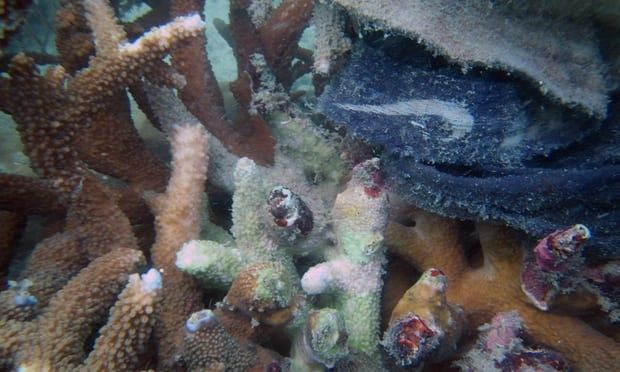Tea bags, plastic bags, fishing nets, and diapers are among the billions of pieces of plastic suffocating the fish and coral reefs in the Asia-Pacific region, new research reveals.
RELATED:
Coral Reefs Have Reached 'Make-or-Break Point': Scientists
An estimated 11.1 billion plastic items float suspended in a sea of blue, as fish and other sea creatures steadily breath and ingest the particles left behind by tourists and residents of nearby islands, scientists say in a recent publication in the journal Science.
According to the study, researchers found that 89 percent of over 124,000 reef-building corals showed signs of disease due to the amount of ingested plastic. Of the plastic-free reefs, which were few and far between, only 4 percent were infected with other diseases.
“Corals are animals just like me and you – they become wounded and then infected,” said Joleah Lamb, Cornell University professor and lead researcher.
Lamb explained the porous nature of plastics is the ideal environment for harmful, disease-carrying microorganisms to enter and infect the host plant.

“It’s like cutting yourself with a really dirty knife,” Lamb said, adding that once the infections have entered, it’s almost impossible to stop.
“It’s like getting gangrene on your toe and watching it eat your body. There’s not much you can do to stop it. If a piece of plastic happens to entangle on a coral it has a pretty bad chance of survival,” she said.
The plastic increases the likelihood of disease about 20 times, to 89 percent for corals in contact with plastics from four percent in comparable areas with none.
Those animals dependant on the coral reefs for food and protection are also at risk, researchers say.
RELATED:
Oil Giants Poured US$180B in Plastics, Pushing 'Near-Permanent' Pollution in Oceans
“You could be diving and you think someone’s tapping your shoulder but it’s just a bottle knocking against you, or a plastic trash bag stuck on your tank,” lead author Joleah Lamb of Cornell University told Reuters.
“It’s really sad,” she said.
Researchers estimate the number of plastic items will rise by 40 percent by 2025 as marine pollution gets steadily worse.
A similar study conducted by Roland Geyer, Jenna Jambeck, Kara Lavender Law says over 8 million tonnes of plastic is dumped into the oceans every year and predicts there will be more disposable items than fish by 2050.